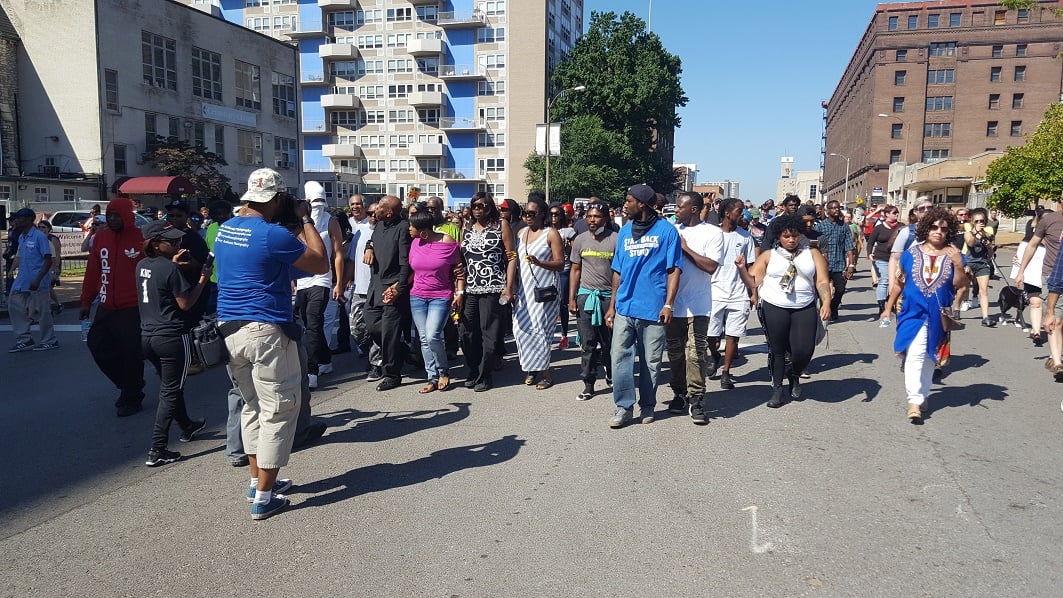ST. LOUIS (CN) — A federal judge prematurely granted class certification to a group claiming their rights were violated by police while protesting a not-guilty verdict in a former cop's murder trial, the Eighth Circuit ruled Tuesday.
In a 2-1 decision, a three-judge panel of the St. Louis-based appeals court remanded the case back to the district court to adjudicate a years-old preliminary injunction in the case.
The plaintiffs were protesting the September 2017 acquittal of former St. Louis police officer Jason Stockley in the murder of Anthony Lamar Smith. In their lawsuit against the city, they claimed it is police custom to use excessive force without proper warning and even as retaliation.
U.S. District Judge Catherine Perry granted the plaintiffs class certification and issued a preliminary injunction blocking police from using chemical agents against those “engaged in expressive activity, unless the persons are acting in concert to pose an imminent threat to use force or violence." That decision prompted the city's appeal to the Eighth Circuit.
ACLU attorney Anthony Rothert represented the protesters in a hearing before a three-judge panel last September. He argued that class certification saved the courts from potentially thousands of similar cases.
But the panel was not swayed, noting in Tuesday's opinion the differences in the three individual plaintiffs. One had intentionally violated state and municipal ordinances when she was pepper-sprayed. Another was recording police activity when he was detained and his phone was seized. The other was an observer, not a participant, of the protests when she was arrested.
Writing for the majority, U.S. Circuit Judge James Loken found that it “is apparent they seek broad injunctive relief” that doesn’t relate to a single policy causing a specific injury.
“Moreover, the premature grant of class certification has seriously delayed the prompt trial on the merits of plaintiffs’ claims for permanent injunctive relief that the mandatory nature of the preliminary injunction requires,” wrote Loken, a George H.W. Bush appointee.
In the September hearing, city attorney Robert Dierker argued that the protesters wanted the district court to play the role of police commissioner and that video evidence refutes their claims of customary excessive force.
In ruling on the preliminary injunction, the appeals court acknowledged that the city had failed to show changed circumstances but took issue with the amount of time that had passed since the preliminary injunction was issued.
“Given the events in the fall of 2017, we do not question the district court’s decision to issue a preliminary injunction that included affirmative mandates pending a prompt trial on the merits of plaintiffs’ claims for a permanent injunction,” Loken wrote. “But there has been no prompt trial.”
He continued, “Instead, the case was referred to a mediator for six months, and the six-month delay became over three years when mediation failed, plaintiffs renewed their motion for class certification, and the court entered an appealable class certification order.” (Emphasis in original.)
The Eighth Circuit ruling was clear that the city “has not shown changed circumstances warranting immediate dissolution,” but since discovery in this case is complete the panel remanded the case back to the district court for a ruling making the injunction permanent or tossing it out completely to be made by Oct. 31.
U.S. Circuit Judge Bobby E. Shepherd, a George W. Bush appointee, joined Loken in the majority opinion.
U.S. Circuit Judge Ralph R. Erickson, a Donald Trump appointee, agreed on the court’s class ruling but dissented on the injunction decision because he found the city’s failure to appeal the preliminary injunction took away its chance to challenge the injunction’s merits.
“Even though the city captioned its motion as a request to ‘dissolve’ the injunction, the essence of its motion was a request to reconsider the injunction,” Erickson wrote. “That the city relied on evidence existing before the district court entered the preliminary injunction is fatal and should have ended the inquiry because we lack jurisdiction to review a request for reconsideration.”
Neither Rothert nor Dierker immediately responded to a request for comment.
Stockley shot Smith, a Black man and suspected drug dealer, in 2011 after a high-speed chase through residential neighborhoods. During the pursuit, according to a probable cause statement, Stockley was heard saying, “going to kill this motherfucker, don’t you know it,” about 45 seconds before the fatal shots were fired.
His acquittal sparked numerous, sometimes violent, protests.
The ACLU filed the civil rights claims on behalf of the plaintiffs a week after the acquittal.
Subscribe to Closing Arguments
Sign up for new weekly newsletter Closing Arguments to get the latest about ongoing trials, major litigation and hot cases and rulings in courthouses around the U.S. and the world.









